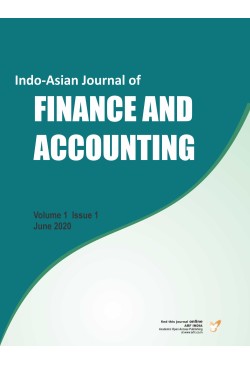
Indo-Asian Journal of Finance and Accounting
Frequency :Bi-Annual
ISSN :2582-6395
Peer Reviewed Journal
Achieving effectiveness in an investigative audit is important in the sense that it attempts to detect frauds. This attempt is not easy to do, therefore, an investigative auditor must possess certain characteristics. This research aims to identify the influence of investigative auditor characteristics in implementing their investigation in order to find frauds. In other words, their procedures were analyzed to find their effectiveness.The population of this research are all investigative auditors assigned in the Office of Finance and Development Supervisory Board (FDSB) of South Sumatera. The data are collected from questionnaires and analyzed by multiple linear regression technique.The research results show that the competence and experience of the auditors either partially and simultaneously had a positive and significant influence on their effectiveness of finding frauds. Of the two variables, their experience was more dominant to effectively find frauds.This research is limited in terms of number of sample, variables which consisted of two – competence and experience, data collection which focused on questionnaires.
Key words: Competence, experience, investigative audit, effectiveness, and fraud.
JEL codes: H61, H83, M42, D22
This study examines the causal relationship between gold price and Indian stock market. In recent times, both domestic gold price and Indian stock price are rising in times of economic uncertainty, high inflation rates and discounting economic reforms. Then it is obligatory to know whether gold price is affecting the stock price in India and vice-versa. This study is based on daily time series data obtained from world gold council database and BSE database. The sample period spans from June 2014 to December 2019. While analyse the data, unit root tests, cointegration and error correction model has been used. Bivariate cointegration test results reveal that gold price is not related to the Sensex in the long run. Vector autoregression model test results confirm that there is a no equilibrium relationship of gold price with Sensex.
Keywords: Gold price, stock price index, India, cointegration, vector autoregression.
This study aims to explore the influence of demographics like occupation, age, level of education, region, marital status, religion and family size on investment avenues in relation to West Bengal. Women investors prefer to go for investment in post office, bank deposits, PPF, NSC, share market, bond, mutual funds, gold, chit fund, LIC and real estate for the purpose of earning additional income, liquidity, safety, contingency benefits, tax benefits, future emergencies etc.
Keywords: Demographic factors, investment avenues, women investors, West Bengal.
The objective of the present study is to find out any affiliation among capital adequacy, management ability and profitability in scheduled urban co-operative banks operating in India. Sound management is the key factors behind the performance of banking institutions. A strong capital adequacy absorbs any incidental loss due to the inherent threat of risk-based capital. Over the years, urban co-operative banks have a significant role in mobilising saving and deposits from small investors of lower and middle income groups and purvey credit to small borrowers including priority sectors of society. During the analysis of this study, various accounting and statistical tools were used. Accounting tools include ratio analysis, while analyse the data, arithmetic mean, standard deviation, coefficient of variation, test of significance, correlation coefficient, and multiple regression analysis have been applied. The affiliation of management ability with profitability in terms of cost of deposits and business per employee is found negatively related and non-interest income to working fund has a positive impact on profitability.
Keywords: Urban co-operative banks, profitability, correlation, multiple regression analysis.
This study observes the issues and challenges in the new composition scheme under GST regime in India. A registered dealer, whose aggregate turnover in the preceding financial year does not exceed Rs. 1.5 crore may opt for composition scheme. But, in Arunachal Pradesh, Assam, Manipur, Meghalaya, Mizoram, Nagaland, Sikkim, Tripura, and Himachal Pradesh, this limit is Rs. 75 lakh. Any person who opts for this scheme shall mention “Composition Taxable Person” on notice or sign board displayed at a prominent place at his place of business. This study is purely descriptive in nature. The study suggests 5%/6% GST under composition scheme should be dropped. Otherwise, the composition scheme will be only an illusion and will not be able to give relief to the startups and small and medium enterprises. So, the GST council needs to give a second thought to the GST rates under composition scheme so far as 5%/6% GST rate is concerned.
Keywords: GST, composition scheme, India, startups start ups, small and medium enterprises.